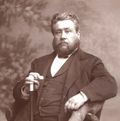Preserve me, O God: for in thee do I put my trust.(Salmos 16:1)
O my soul, thou hast said unto the LORD, Thou art my Lord: my goodness extendeth not to thee;(Salmos 16:2)
But to the saints that are in the earth, and to the excellent, in whom is all my delight.(Salmos 16:3)
Their sorrows shall be multiplied that hasten after another god: their drink offerings of blood will I not offer, nor take up their names into my lips.
The LORD is the portion of mine inheritance and of my cup: thou maintainest my lot.(Salmos 16:5)
The lines are fallen unto me in pleasant places; yea, I have a goodly heritage.(Salmos 16:6)
I will bless the LORD, who hath given me counsel: my reins also instruct me in the night seasons.(Salmos 16:7)
Otras publicaciones relacionadas con "Salmos 16:4":
Salmos 16:4 - Referencia Cruzada
But ye are they that forsake the LORD, that forget my holy mountain, that prepare a table for that troop, and that furnish the drink offering unto that number. (Isaías 65:11)
And it shall be at that day, saith the LORD, that thou shalt call me Ishi; and shalt call me no more Baali. (Oseas 2:16)
And the third angel followed them, saying with a loud voice, If any man worship the beast and his image, and receive his mark in his forehead, or in his hand, (Apocalipsis 14:9)
Among the smooth stones of the stream is thy portion; they, they are thy lot: even to them hast thou poured a drink offering, thou hast offered a meat offering. Should I receive comfort in these? (Isaías 57:6)
And Jacob set up a pillar in the place where he talked with him, even a pillar of stone: and he poured a drink offering thereon, and he poured oil thereon. (Génesis 35:14)
He that killeth an ox is as if he slew a man; he that sacrificeth a lamb, as if he cut off a dog's neck; he that offereth an oblation, as if he offered swine's blood; he that burneth incense, as if he blessed an idol. Yea, they have chosen their own ways, and their soul delighteth in their abominations. (Isaías 66:3)
The children gather wood, and the fathers kindle the fire, and the women knead their dough, to make cakes to the queen of heaven, and to pour out drink offerings unto other gods, that they may provoke me to anger. (Jeremías 7:18)
Many sorrows shall be to the wicked: but he that trusteth in the LORD, mercy shall compass him about. (Salmos 32:10)
Yea, they sacrificed their sons and their daughters unto devils, (Salmos 106:37)
Confounded be all they that serve graven images, that boast themselves of idols: worship him, all ye gods. (Salmos 97:7)
And I heard another voice from heaven, saying, Come out of her, my people, that ye be not partakers of her sins, and that ye receive not of her plagues. (Apocalipsis 18:4)
That ye come not among these nations, these that remain among you; neither make mention of the name of their gods, nor cause to swear by them, neither serve them, nor bow yourselves unto them: (Josué 23:7)
And in all things that I have said unto you be circumspect: and make no mention of the name of other gods, neither let it be heard out of thy mouth. (Éxodo 23:13)
They that observe lying vanities forsake their own mercy. (Jonás 2:8)
And the meat offering thereof shall be two tenth deals of fine flour mingled with oil, an offering made by fire unto the LORD for a sweet savor: and the drink offering thereof shall be of wine, the fourth part of an hin. (Levítico 23:13)





